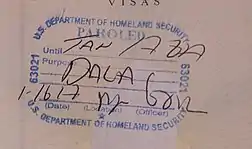Parole (United States immigration)
Parole in the Immigration and Nationality Act (INA) of the United States generally refers to any alien who is under the supervision of the U.S. Department of Homeland Security (DHS).
Handwritten annotations indicate that the stamp on the left was issued at John F. Kennedy International Airport in January 2017 under the Deferred Action for Childhood Arrivals (DACA) program, and the stamp on the right was issued at Logan International Airport in March 2016 under the criterion of deferred action for an adjustment of status applicant.
Any alien who is inadmissible to the United States may apply for advance parole (Form I-131), which is also known as humanitarian parole, and when granted allows the alien to stay in the country until the document expires.[1] Humanitarian parole is granted only in exceptional circumstances and on a case-by-case basis at the discretion of the DHS.[2]
Advance parole
.jpg.webp)
Advance parole, also known as humanitarian parole, is a permit for a non-U.S. national, who does not have a valid immigrant visa, to re-enter the United States after traveling abroad. Such persons include those who have applied to adjust their status to that of permanent resident or to change their non-immigrant status. Advance parole must be approved before the applicant leaves the United States, or any residency application be denied unless exceptional circumstances are demonstrated by the alien.[3] It is granted when immigration document Form I-512 is issued by the United States Citizenship and Immigration Services (USCIS), which enables an alien to be paroled into the United States. It is not a U.S. visa or a re-entry permit; it is only issued to people without permanent residency.
To obtain an advance parole, an applicant must file Form I-131 ("Application for Travel Document"), with supporting documentation, photos, and fee, at a local USCIS office or the service center having jurisdiction over their place of residence.
Eligibility
Aliens in the United States need an advance parole if they have:
- an application for adjustment of status pending.
- been admitted as a refugee or have been granted asylum.
- been granted benefits under the Family Unity Program.
- been granted Temporary Protected Status (TPS).
- an asylum application pending.
- an emergent personal or bona fide reason to travel temporarily abroad.
Note: Aliens holding valid K-3 or K-4 visas, as well as H-1 (temporary worker in a specialty occupation) or L-1 (intra-company transferee) visas and their dependents in H-4 or L-2 status who have filed for adjustment of status do not have to file for advance parole as long as they maintain their non-immigrant status.[4]
Aliens in the United States are not eligible for an advance parole if they are:
- in the United States without a valid immigration status.
- an exchange alien subject to the foreign residence requirement.
- the beneficiary of a private bill.
- in removal proceedings.
The document
.jpg.webp)
Advance parole can come on a letter-sized piece of paper titled "Authorization for Parole of an Alien Into the United States". For applicants who apply for advance parole together with an employment authorization document (EAD), USCIS issues a "combo card", a variant of the EAD card which contains the words "SERVES AS I-512 ADVANCE PAROLE".
Re-entry into the United States
Advance parole does not guarantee admission into the United States. Aliens who have obtained advance parole are still subject to the inspection process of the U.S. Customs and Border Protection at the port of entry. However, aliens who would otherwise be automatically inadmissible due to a period of unlawful presence, will not be inadmissible if they have advance parole.[5]
Parole for start-up entrepreneurs
The DHS has published a new rule, effective July 17, 2017, which adds new provisions regarding the use of parole on a case-by-case basis with respect to entrepreneurs of start-up entities who demonstrate that they will provide a significant public benefit to the United States.[6]
References and notes
- "Humanitarian or Significant Public Benefit Parole for Individuals Outside the United States". December 15, 2017. Retrieved August 19, 2018.
- New York Times: Nina Bernstein, "A Contest of Suffering, With the U.S. as a Prize," October 14, 2005, accessed August 7, 2011
- ("The term 'exceptional circumstances' refers to exceptional circumstances (such as battery or extreme cruelty to the alien or any child or parent of the alien, serious illness of the alien, or serious illness or death of the spouse, child, or parent of the alien, but not including less compelling circumstances) beyond the control of the alien.")
- 8 CFR § 245.2(a)(4)(ii)(C), July 1, 1999, http://www.uscis.gov/ilink/docView/SLB/HTML/SLB/0-0-0-1/0-0-0-11261/0-0-0-24520/0-0-0-24707.html
- Matter of Arrabally and Yerrabelly, 25 I&N Dec. 771 (BIA 2012) ("An alien who leaves the United States temporarily pursuant to a grant of advance parole does not thereby make a 'departure . . . from the United States' within the meaning of section 212(a)(9)(B)(i)(II) of the Immigration and Nationality Act, (2006). Matter of Lemus, 24 I&N Dec. 373 (BIA 2007), clarified").
- "USCIS FINAL RULE ON PAROLE FOR START-UP ENTREPRENEURS". Givi Kutidze. January 15, 2017.
Further reading
- I-131, Application for Travel Document (USCIS)
- i-212, Permission for reentry (lawyers Tank)

.jpg.webp)